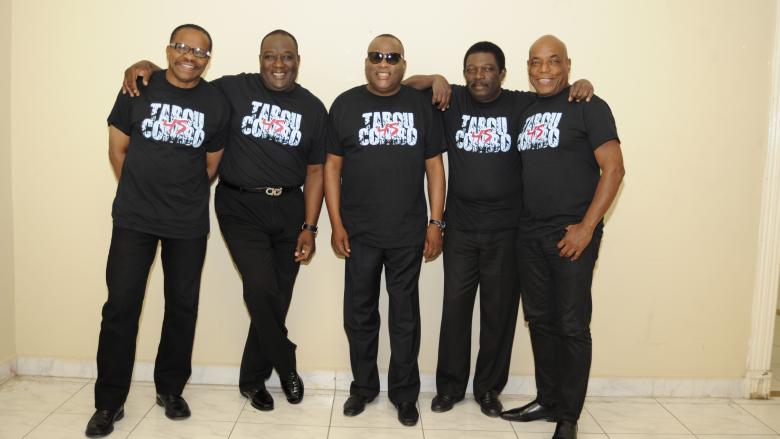Yves “Fanfan” Joseph and Tabou Combo de Petionville began their remarkable journey over 30 years ago, forging a path that forever altered the landscape of Konpa music. With their signature sound and groundbreaking success, the band not only set the blueprint for the genre but also transcended Haiti’s borders, achieving international acclaim. Tabou Combo set the gold standard by which all other bands are measured, pioneering a level of success and influence that few have matched. But as with all long-lasting careers, this success has come at a price.
Roger “Shoubou” Eugene, Yves “Fanfan” Joseph, Herman Nau, and the other original members made countless personal sacrifices to maintain their band’s position at the top, delivering iconic performances that made fans “baissez bas” in dancehalls worldwide. Yet, life on the road is demanding, and after decades of touring and performing, wear and tear on both body and mind inevitably begins to show. There are whispers that longtime drummer Herman Nau has retired from the band for a government role in Haiti, signaling a significant shift for the group.
Tabou Combo now faces a crossroads, similar to what music legends like Michael Jackson, The Beatles, and Earth, Wind & Fire have encountered: a time when change is inevitable. Do they adapt to the shifting audience tastes, or does the band evolve to meet new challenges? Time spares no one, and even the greatest artists must confront the reality of change.
On April 7, 2001, Tabou Combo’s performance at St. Michael’s Church in Silver Spring, Maryland, raised questions about the future of the group. Despite the success of their latest album, Sans Limites, the band struggled to draw the large crowds that other popular groups like T-Vice and Zenglen consistently attract. The energy and excitement that Tabou Combo was once famous for were noticeably diminished, and the professionalism that defined the band seemed to be fading. Onstage disagreements were increasingly evident, and the internal tension among the members became a distraction for both the performers and the audience.
It’s impossible to discuss modern Haitian music without acknowledging Tabou Combo’s unparalleled influence. Shoubou’s voice has left an indelible mark on Konpa, inspiring countless singers and musicians across generations. His stage presence, charisma, and vocal prowess set a precedent that many artists emulate today. Even Zouk music, which evolved from the French Caribbean, bears traces of Tabou Combo’s influence, especially in regions like Martinique, where Shoubou’s impact is still felt.
However, it is painful to witness a legend struggling. Shoubou, once the force behind Tabou Combo’s unmistakable sound, appears to be at a transitional stage in his life, showing signs of exhaustion and strain. Observers fear that without proper support, the band’s legacy could suffer. As the group stands at this pivotal moment, they must make important decisions about their future. Younger, talented musicians like Danny Pierre, Ralph Condé, and Ronald Felix have already shown their potential on the latest album, suggesting that the future of the band could lie in their hands.
Yet, the challenge is greater than talent alone. Today’s audience, particularly the younger generation, is growing up in an age of digital media, with influences from MTV, BET, and a myriad of entertainment options. For $25 or $30, concertgoers demand more than just a traditional bal; they seek an experience that merges the classic Konpa sound with modern production and entertainment standards. If Tabou Combo is to maintain its legendary status, it will need to adapt to these changing times.
As Langston Hughes once asked, “What becomes of a dream deferred?” This sentiment rings true for Haitian musical legends like Tabou Combo. The founders of the band hold a wealth of experience, knowledge, and artistry that should be shared with future generations. Rather than fading into obscurity, these musicians should become educators, producers, and promoters, passing on their wisdom to young artists and helping to guide Haiti’s musical future.
There is no denying Tabou Combo’s greatness. Even in their current state, they remain one of the best bands in the Haitian music scene. However, their self-imposed standard of excellence is difficult to maintain, and after more than 30 years of shaping Konpa, they now face a critical juncture. The new generation of fans, musicians, and industry professionals must help Tabou Combo navigate this crossroads, ensuring that the legacy they built continues to inspire for years to come.
The story of Tabou Combo is far from over, but the next chapter depends on the band’s ability to evolve while staying true to the artistry that made them icons in the first place.
